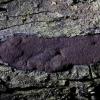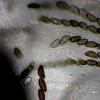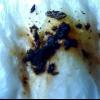
25-01-2026 23:23
Hello! I found this species that resembles Delitsc

18-01-2026 12:24
Hello.An anamorph located on the surface of a thin

23-01-2026 21:50
Cameron DKI am looking for this please publication. is anyon

10-01-2026 20:00
Tom SchrierHi all,We found picnidia on Protoparmeliopsis mur

21-01-2026 16:32
Gernot FriebesHi,I need your help with some black dots on a lich

21-01-2026 16:48
Gernot FriebesHi,after my last unknown hyphomycete on this subst

20-01-2026 17:49
 Hardware Tony
Hardware Tony
I offer this collection as a possibility only as e

15-01-2026 15:55
 Lothar Krieglsteiner
Lothar Krieglsteiner
this one is especially interesting for me because
Hypoxylon petriniae ?
Thierry Blondelle,
12-03-2023 10:11
 Hello !
Hello !I'm a new member from France.
I require your advise for this sample of Hypoxylon found on a dead branch of Fraxinus.
I think to H. petriniae with these inconspicuous perithecal mouds.
Ascospores: 12-10 x 4-5 µm with double guttula in most of them.
Thanks
Thierry Blondelle
Lothar Krieglsteiner,
12-03-2023 10:21

Re : Hypoxylon petriniae ?
Hello Thierry,
can you tell us which color the pigment extracted with 10% KOH has?
Yours, Lothar
can you tell us which color the pigment extracted with 10% KOH has?
Yours, Lothar
Thierry Blondelle,
12-03-2023 10:39
Jacques Fournier,
12-03-2023 15:53

Re : Hypoxylon petriniae ?
Hi Thierry,
you are likely right, but H. petriniae may be highly variable in colour and external appearence, making its identification sometimes challenging.
A good discriminating character from other species with orange pigments is the relatively weak thickness of the stromata, rarely over 0.5 mm thick, combined ith the small diameter of perithecia, mostly 0.3-0.4 mm diam.
Cheers,
Jacques
you are likely right, but H. petriniae may be highly variable in colour and external appearence, making its identification sometimes challenging.
A good discriminating character from other species with orange pigments is the relatively weak thickness of the stromata, rarely over 0.5 mm thick, combined ith the small diameter of perithecia, mostly 0.3-0.4 mm diam.
Cheers,
Jacques
Thierry Blondelle,
12-03-2023 18:06

Re : Hypoxylon petriniae ?
Thanks Jacques for these additionnal informations.


